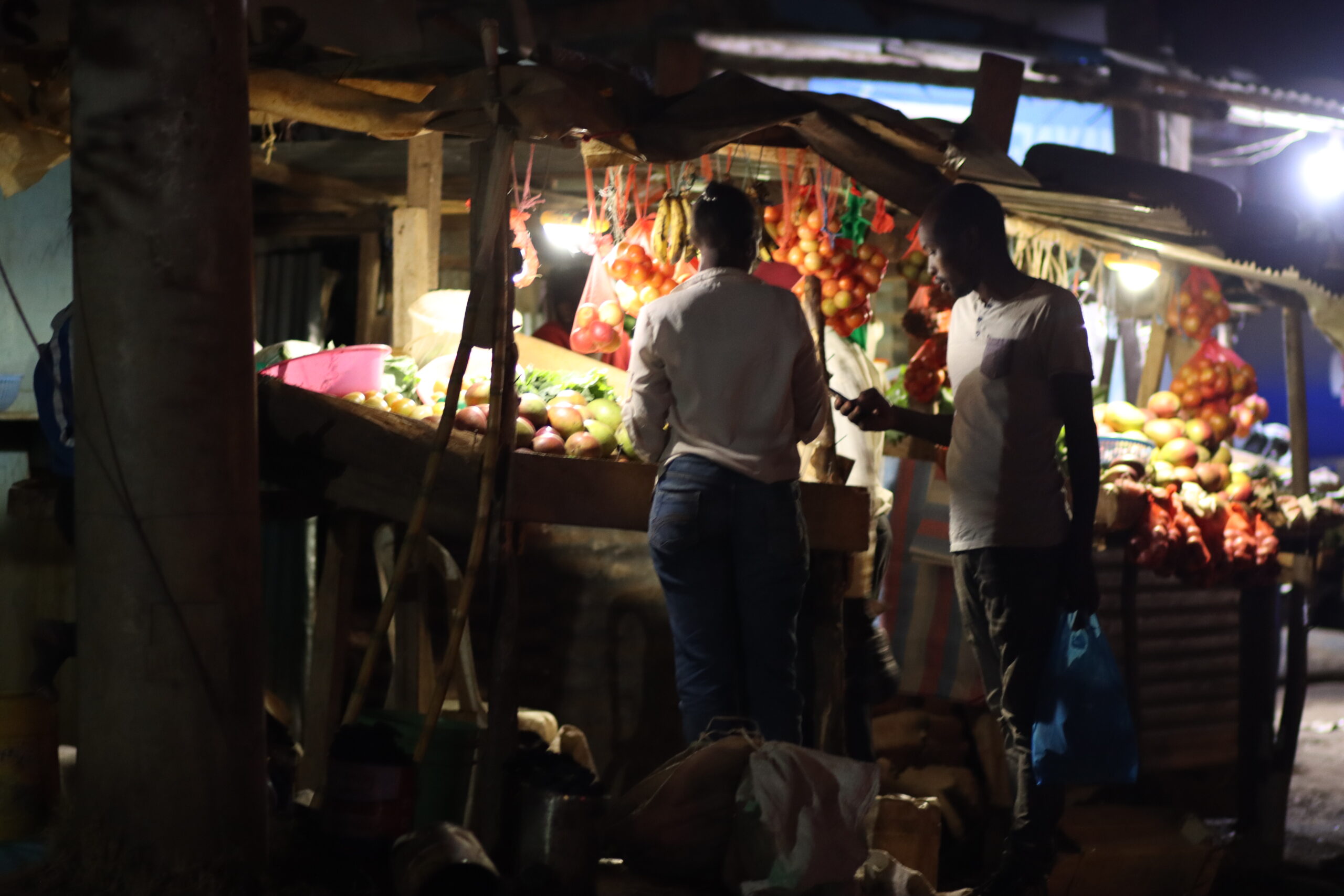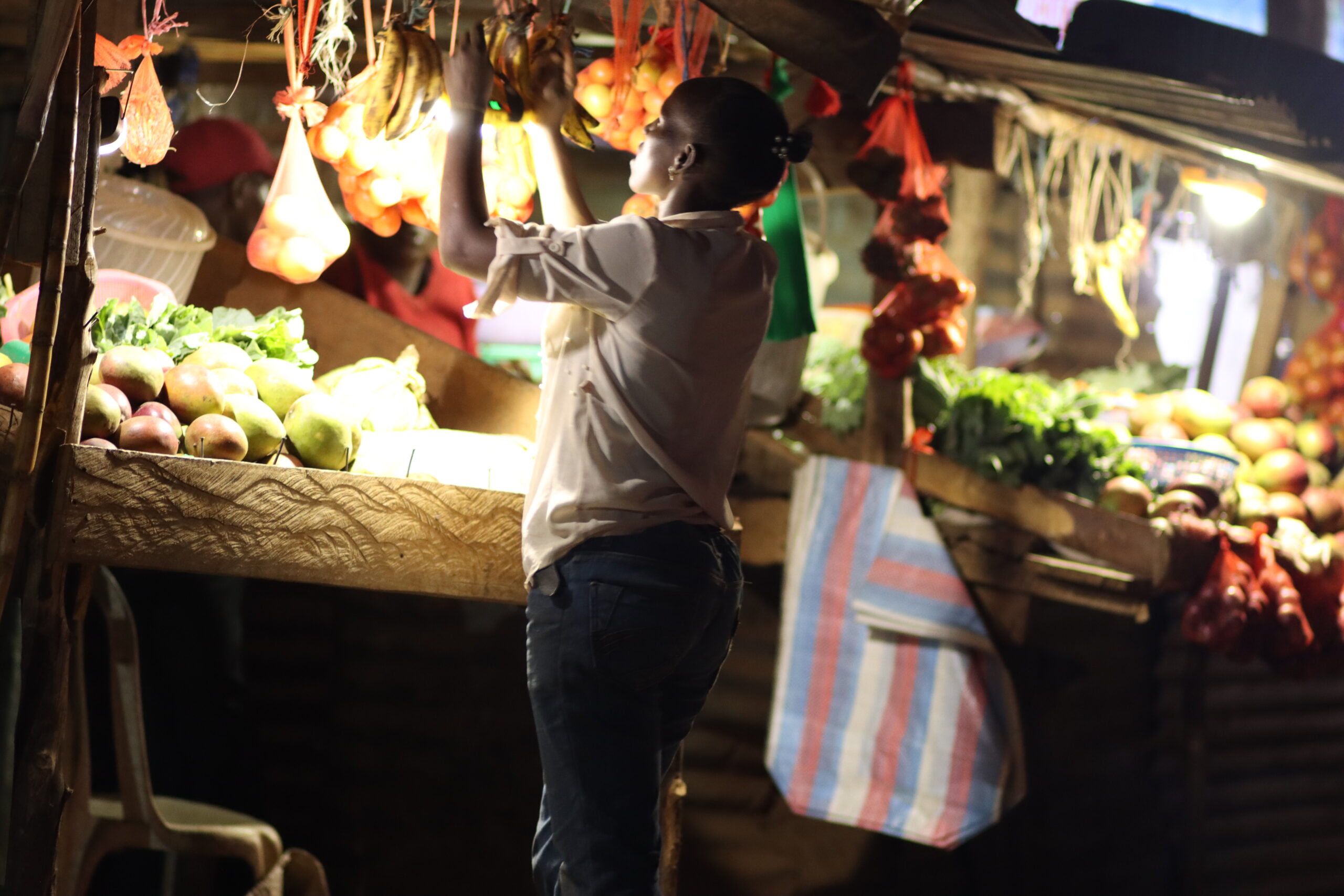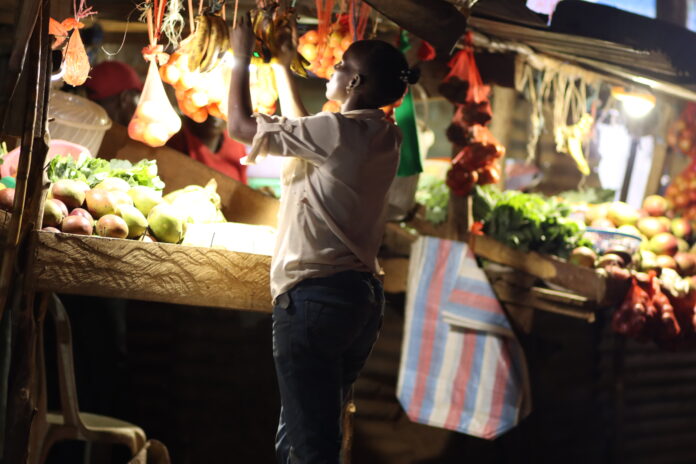By Wesley Langa’t
Nakuru County, Kenya: Gloria Tarus 28, a mother of two runs a grocery business at Kampi Ya Moto town located along Nakuru-Kabarnet road,20 minutes drive from Nakuru city. It’s 8:00 pm, a peak hour for her business. Customers are queuing to buy vegetables while others are standing aside waiting for their turn. The area is brightly lit by two solar-powered bulbs fixed on the sides of her Makeshift shade with a corrugated iron roof.
“This light is helping me to attract customers because someone at a distance can tell of my presence,” She said while busy serving customers.
During the global pandemic, Gloria shut down her business for several months and she had no other business to do. Despite a huge blow from Covid-19, her business has gained momentum owing to extra hours that she extends at night. This is after she recently bought a solar lamp at a cost of Ksh.7000, a necessity that has greatly impacted the business by enabling her to productively utilize the evening hours.

“I do a lot of sales in the evening hours from 6 pm-11 pm and I can make up to Ksh.2000 to Ksh.3000 on a good day.”
Although grid supplies are a few meters away which is supposed to be the easiest source of light, connecting this power to small, isolated, and temporary structures like this can be expensive and often not economical. She added that with the current requirement, tedious process, and unaffordable cost of connecting electricity she is unable to get connected.
“I preferred using portable solar-powered lamps because after buying them there is no recurrent cost, very affordable to me and I can as well use it at home because it is portable.” She added.
Like many parts of rural areas in Africa, Kenya’s least developed and remote villages often remained without electricity. Before she bought a set of solar lamps, Gloria shares her experience of running a business without electricity. The place was dark, a situation that makes it very difficult for many small-scale traders like her to sell at night. She says that most of the time she was worried about her safety and as a result, she would close her business very early.
While Leonida Kipkechem, Gloria’s neighbor, remembers how she used to light candles and on a windy evening, they get blown off. Sometimes she uses a rechargeable torch that lasts only for an hour before it goes off. This made it very difficult for her to operate her business late in the evening. But she decided to buy the same sets of solar-powered lamps and therefore each of them has a source of light.
The Energy Progress Report 2022 published by the United Nations, shows that the Covid-19 pandemic slowed the progress towards attaining Sustainable Development Goal 7 “Ensure access to affordable, reliable, sustainable and modern energy for all” in Sub-Saharan Africa.
According to the report, the African continent has the largest share of the population without electricity which rose from 71 percent in 2018 to 77 percent in 2020. In this context, Gloria is among the 600 million people without access to electricity in Africa. To enable equal access to electricity, the African continent needs at least $31 billion per year by 2030 according to the report.
Gloria and Leonida admitted that access to clean, available, affordable, and reliable energy has boosted their business. Their stock has increased in volume significantly and now businesses are thriving. Income from the business has made it possible for them to buy food, and pay fees and rent thus cushioning them against the current high cost of living. This is a clear indication that with access to energy, women entrepreneurs can power their businesses in off-grid areas hence boosting productivity and growth.
Renewable energy like solar is an ingredient to rapid development growth. Mr.Andrew Amadi, the director at Kenya Renewable Energy Association, a non-profit association dedicated to facilitating the growth and development of renewable energy business in Kenya, emphasized the importance of energy as it helps in raising the productivity of local micro-enterprises and other commercial activities hence eradicating poverty.
The unpredictable weather pattern leads to poor crop yields thus aggravating the food crisis, Mr.Amadi commented that the affordability of renewable energy is enabling communities to diversify their livelihoods to venture into other sources such as businesses and hence sustaining their livelihood including buying food.

“Today, the biggest advantage that is driving renewable energy is the cost. The cost has been coming down. And then once you pay for it, that is it, you are not paying another cost again” Amadi said.
He also stressed the need for the government and other institutions to prioritize communities in far-flung areas when implementing and deploying renewable energy technologies to unlock financial opportunities in the remotest areas.
“Take productive use of renewable energy to that community and give them equity in a real business.” He commented in a phone call interview.
While the country still relies on hydropower generation which is highly sensitive to climate change, Stephen Nzioka, deputy director of renewable energy at Kenya’s Ministry of Energy and Petroleum revealed that 78% of Kenya is not served by the grid. The Ministry of Energy reports that the ongoing droughts have caused a huge reduction in water levels at the seven major power generation dams. This in turn will result in the reduction of power generation and the high cost of power.
The director noted that it is for this reason that the government is plugging in renewable energy, especially solar to bridge the gap. He added that Kenya has the potential of generating energy from renewable sources such as solar, wind, and geothermal which will help in meeting the energy demands.
Mr.Nzioka contextualized solar energy as a necessity for small-scale traders living in remote villages hence a lot of solar home systems are being sold, and people have adopted it. According to Nzioka, the min-grid aims at serving underserved areas and as a result spurring industrialization in marginalized areas.
He also mentioned that his ministry of energy has a long-term plan of using renewable energy, especially solar to reach universal access to electricity by 2030 through the Kenya Off-grid Solar Access Project (KOSAP).
This publication was produced with the financial support of the European Union. Its contents are the sole responsibility of Wesley Langa’t and do not necessarily reflect the views of the European Union.














